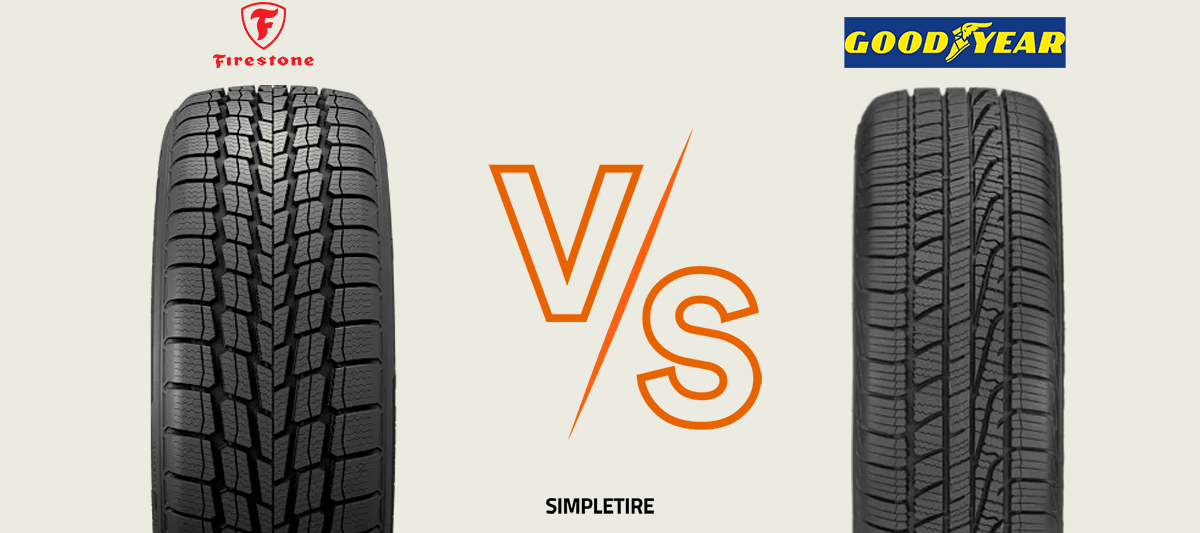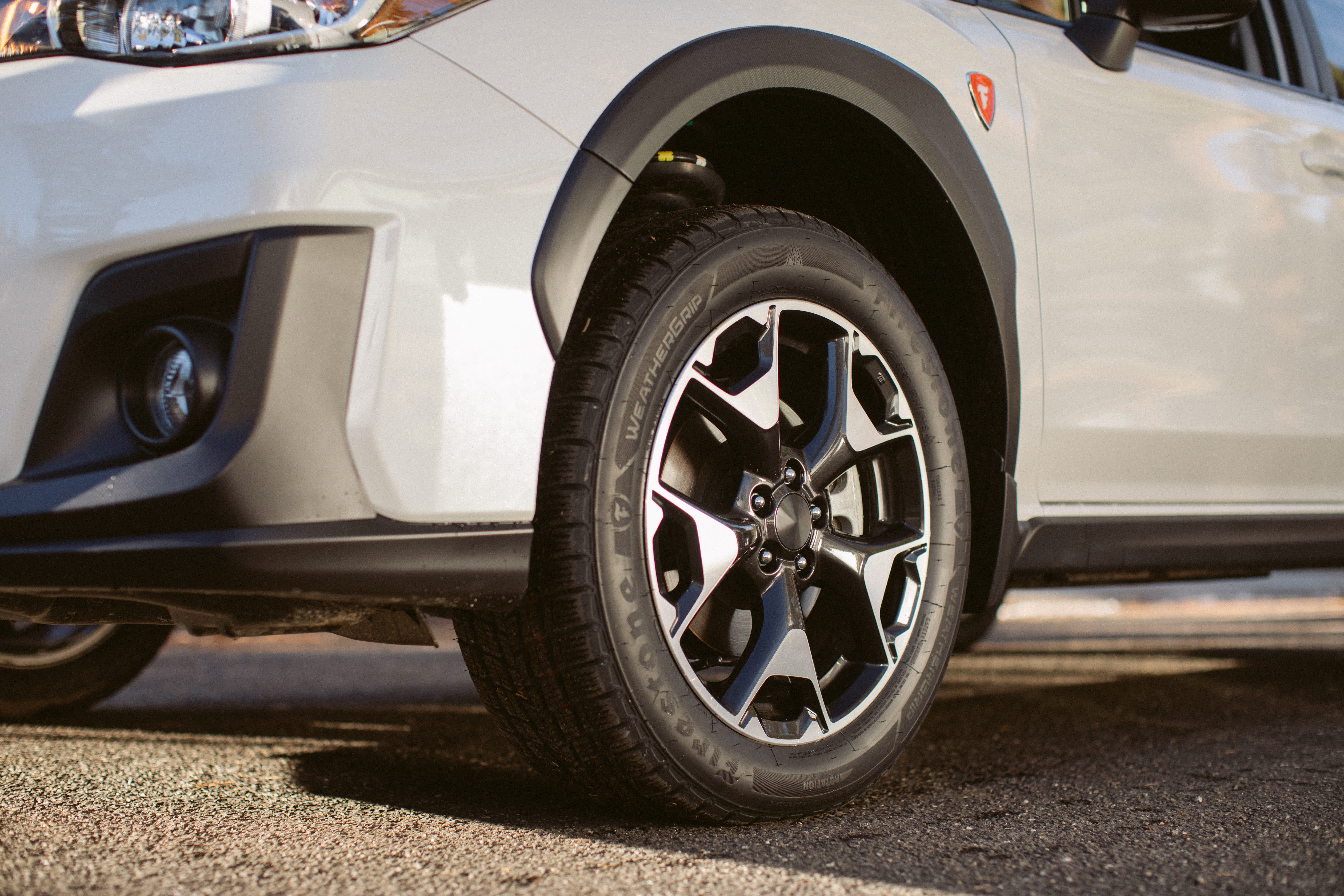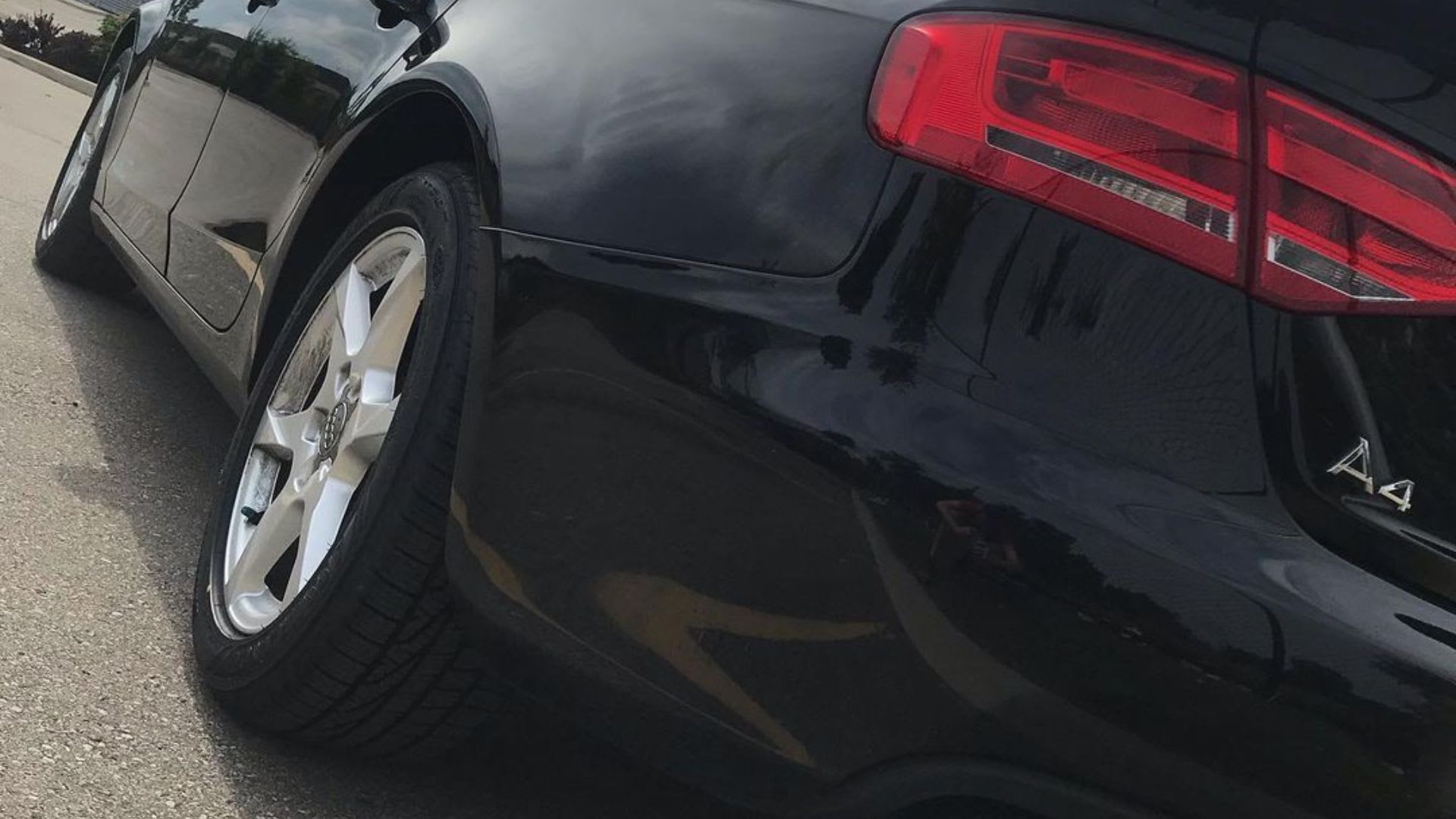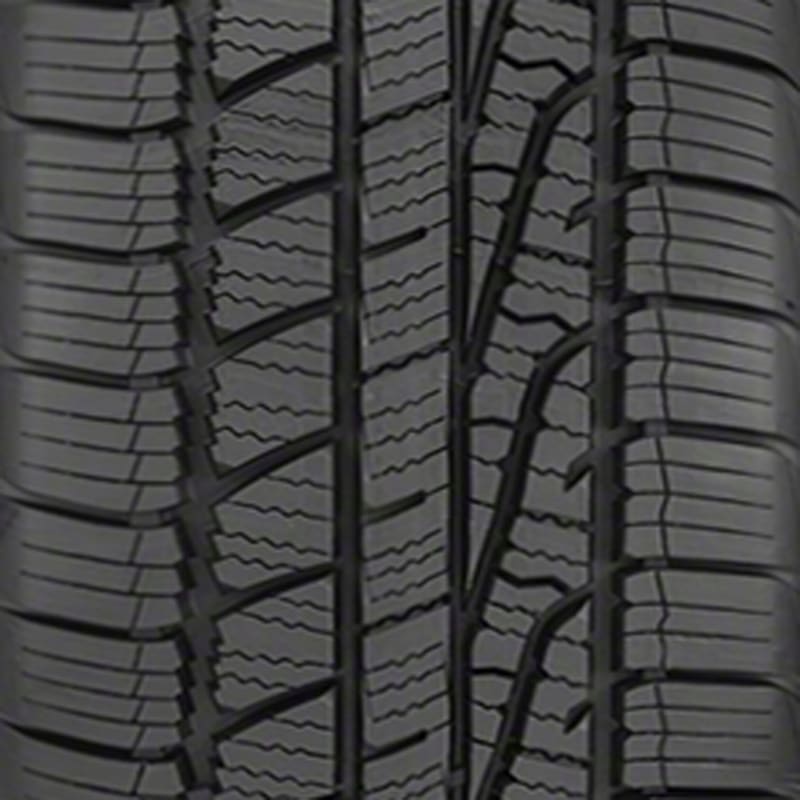Compare

For many drivers, the all-weather category in the tire world might be a little unfamiliar, so what’s the deal with them? How do they differ from all-season tires? All-weather tires are designed to fill a very specific role where all-season tires aren’t quite capable. If you’ve ever tried to make your way through rough winter conditions when there are 3-4 inches of snow on the roads, you’ve probably already found out that most all-season tires are usually just going to fall short of getting the job done for you (in most cases).
All-weather tires are optimized to offer better winter traction with optimized rubber formulations, more capable tread patterns, redesigned sipe networks, and other features that are all designed for reliable traction in snow and slush. In other words, all-weather tires are designed for a specific gap between all-season and winter tires, without the headache of dismounting winter tires and then figuring out how to store them once temperatures get above 40-45 degrees Fahrenheit.
Are you familiar with SimpleScore? SimpleScore is a proprietary system the SimpleTire team developed to give you a quick, at-a-glance idea of a tire’s strengths and weaknesses. We take a look at the specs, review information, and other data points for any given tire, then use that information to arrive at a numerical value from 1-10 for traction, handling, longevity, and an overall average SimpleScore. For the Firestone Weathergrip and Goodyear Assurance WeatherReady, the SimpleScore numbers shake out like this:
Goodyear Assurance WeatherReady
- Traction: 9.6
- Handling: 9.3
- Longevity: 8.8
- Overall average SimpleScore: 9.2
Firestone Weathergrip
- Traction: 8.6
- Handling: 8.6
- Longevity: 9.2
- Overall average SimpleScore: 8.7
As you can see, there are some pretty notable disparities in the scores between Firestone and Goodyear in the pertinent SimpleScore categories, but that doesn’t really tell the full story. As handy as SimpleScore is, it’s still a 30,000 foot view that doesn’t give you a detailed idea of a tire’s capabilities. Let’s get in there and get a closer look at this Firestone Weathergrip vs Goodyear Assurance WeatherReady tire comparison review:
Firestone Weathergrip tires

First up we’ve got the Weathergrip from Firesetone, a premium all-weather tire with the Three Peak Mountain Snowflake certification for severe winter service. Firestone packed the Weathergrip with features like their Hydro-Grip Technology Package that includes a fat, rounded contact patch, chamfered shoulder blocks, full-depth grooves, and open shoulder slots, a system designed to work together to give an edge in grip and performance. Winter traction is capable and dependable with Firestone’s Snow Traction Claw Technology, a network of interlocking grooves, snow vices on the intermediate ribs, and high-density zigzag sipes.
Open shoulder slots and circumferential grooves resist hydroplaning by efficiently routing water away from the tire’s contact patch. Internal construction details of the Firestone Weathergrip include a single-ply nylon casing capped by a steel belt package and a nylon reinforcement layer. The Firestone WeatherGrip is covered by a 65,000 mile warranty. Braking performance, cornering, and steering response are confident, neutral, and predictable, and the tread pitch arrangement of the Weathergrip is randomized and computer-tuned to keep road noise low by disrupting certain frequencies and overtones. SimpleTire’s price on the Firestone Weathergrip starts at $125.99 per tire.
Goodyear Assurance WeatherReady tires

The engineers at Goodyear started from the ground up with Assurance WeatherReady. It’s designed around an environmentally sustainable, silica-rich, soy-based compound that offers dependable traction and great wear properties. If you were to take the tire apart, you’ll find two wide steel belts that reinforce a single-ply polyester casing, with a polyamide cap ply layer designed for high-speed road manners, ride comfort and light, immediate steering response.
For year-round traction, the tread design Assurance WeatherReady includes a system of outboard ribs for traction on wet or snowy roads, Goodyear’s 3D TredLock Technology Blades, and specially designed sipes in the tread’s center. Goodyear’s Evolving Traction Grooves are an innovative design that keeps providing traction even as tread depth gets thinner and other tires would naturally start to lose their grip. Sweeping Tread Grooves and the tire’s circumferential grooves work as a system, removing water from the tire’s contact patch and resisting the tendency to hydroplane. For performance in snow and slush, Goodyear’s Zigzag Biting Edges along the tire’s inboard ribs dig in for dependable traction, earning the Goodyear Assurance WeatherReady the tire industry’s Three Peak Mountain Snowflake certification for severe winter service.
Goodyear backs the Assurance WeatherReady with a 60,000 mile limited manufacturer tread life warranty. SimpleTire’s price on the Goodyear Assurance WeatherReady starts at $163.99 per tire.
Firestone Weathergrip vs Goodyear Assurance WeatherReady tires on traction
With a SimpleScore of 9.6 for the Goodyear and 8.6 for the Firestone in the traction category, this one’s not really close. Why the big spread in SimpleScore ratings? Both tires have the 3 Peak Mountain Snowflake rating for severe winter service (a certification that the rubber industry sets a high bar for). The traction features of the Goodyear, though, like its 3D TredLock Technology Blades, Evolving Traction Grooves, and Zigzag Biting Edges are designed for a real advantage in performance on wet or snowy roads. We’re especially impressed with any feature that continues to enhance traction as a tire wears down, especially since it’s just intuitive that any tire’s grip and control will start to drop off as tread depth gets shallower. It’s a pretty easy call on this one:
ADVANTAGE: Goodyear Assurance WeatherReady:
Firestone Weathergrip vs. Goodyear Assurance WeatherReady tires on handling

It’s just axiomatic that traction and handling properties go hand-in-hand with each other. Sure enough, the Goodyear Assurance WeatherReady comes in with a very strong SimpleScore of 9.3 for handling vs 8.6 for the Firestone Weathergrip. All those features that help the Goodyear deliver a confident grip in all kinds of weather and road conditions also help keep it firmly planted on the pavement during fast maneuvers, whether it’s an emergency swerve, a winding hill country road, or a hot corner. Those tread features and the durable construction of the Goodyear give it the rigidity it needs for sharp cornering ability and immediate steering response. The momentum of a vehicle as it goes into a corner tends to put a lot of stress on the tire’s sidewall and shoulder, leading to tread deformation, and the reinforced design of the Goodyear makes a big difference when it comes to nimble and consistent handling ability. Our call:
ADVANTAGE: Goodyear Assurance WeatherReady
Firestone Weathergrip vs. Goodyear Assurance WeatherReady tires on longevity
In the handling category, the Firestone pulls ahead with a SimpleScore of 9.2 vs 8.8 for the Goodyear. This one’s really pretty clear-cut, as SimpleScore rankings for longevity are usually tied straight in with the tire’s warranty coverage. In this case, the Firestone comes in with a 65,000 mile limited manufacturer’s tread life warranty, vs 60,000 miles for the Goodyear. Easy call:
ADVANTAGE: Firestone Weathergrip
When to use each
The Firestone Weathergrip and Goodyear Assurance WeatherReady are both top-notch all-weather tire options, tires you can count on for dependable traction year-round. As we noted, all-weather tires can be an ideal solution for anyone who has to contend with challenging winter weather every year but doesn’t want to deal with the headache of specialized winter tires. The tread compound is softer to stay pliable for dependable grip at subfreezing temperatures (think the traction of a rubber boot vs. a hard-rubber hockey puck).
The downside of that is that a winter tread compound wears prematurely on warmer days. When temperatures get above 40-45 degrees, tire manufacturers recommend removing your winter tires and swapping them for all-season tires again - leaving you with the headache of finding a place to store them for the next nine months until the weather gets cold and the snow starts flying again. With a 3PMSF rating and true year-round performance, all-season tires are a great way around that; if that sounds like your situation, you can’t go wrong with the Firestone or Goodyear.
Which one should you choose?

So here’s what we’ve all been waiting for. As you can see from the SimpleScore comparisons and the detailed breakdowns of each tire’s design and performance in those categories, the Firestone Weathergrip and Goodyear Assurance WeatherReady are tires that compare well with each other and perform admirably all the way around. It’s our honest take that either one of these tires would be a great choice for your sedan, coupe, minivan, SUV, or crossover if you live in a part of the country where you need winter traction (but don’t want to have to deal with winter tires).
So, in light of that, let’s take prices into account too: the Goodyear starts at $163.99 per tire vs $125.99 per tire for the Firestone. That’s enough to make a difference of at least $200 on a full set of tires, after taxes, mounting, and disposal fees. Yes, the Goodyear edges out the Firestone in the SimpleScore categories, but that does come at a premium and it doesn’t mean that the Firestone’s not up to the job. Let’s just break it down this way: if you can afford the Goodyear Assurance WeatherReady, that would be a great choice. If you’re on a bit more of a budget and need a premium quality all-weather tire, the Firestone Weathergrip would also be an excellent option. We don’t think you’re going to feel shorted or let down by either tire.
Still unsure which tire to buy? Fortunately, SimpleTire is here to help. Our helpful agents are more than happy to assist you in selecting the right tire for your ride and budget.
Ready to find the perfect tires?
Search By